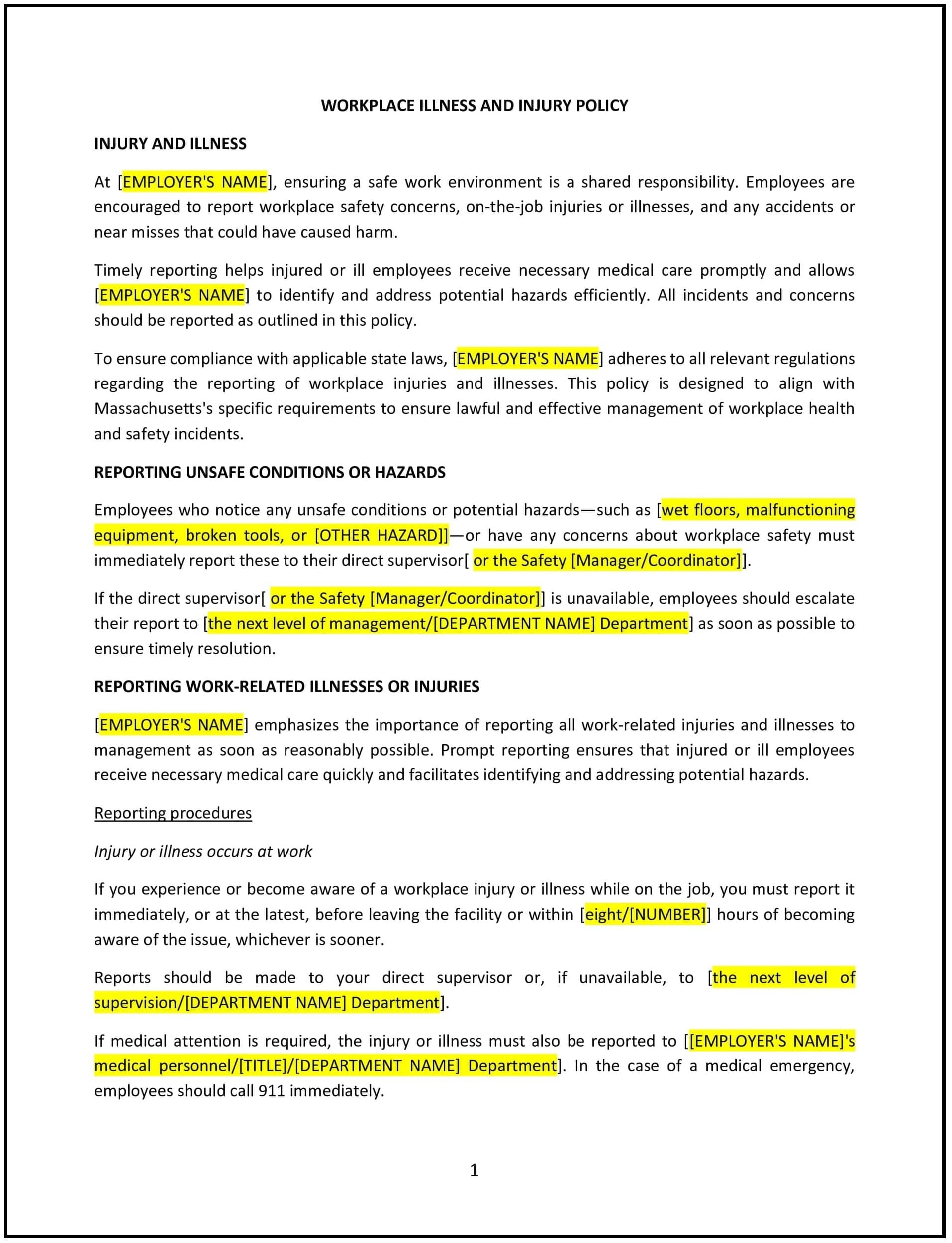Workplace illness and injury policy (Massachusetts): Free template
Got contracts to review? While you're here for policies, let Cobrief make contract review effortless—start your free review now.

Customize this template for free
This workplace illness and injury policy is designed to help Massachusetts businesses manage employee health and safety by addressing the procedures and support provided when employees experience illness or injury at work. The policy outlines how to report, respond to, and manage workplace illnesses and injuries, while ensuring that employees receive appropriate care and support. It also covers the company’s approach to maintaining a safe working environment and complying with Massachusetts and federal workplace safety laws.
By adopting this policy, businesses can promote a healthier work environment, improve employee well-being, and reduce the risk of legal issues related to workplace illnesses and injuries.
How to use this workplace illness and injury policy (Massachusetts)
- Define illness and injury: Clearly define what constitutes a workplace illness or injury under the policy. This includes both physical injuries, such as accidents or strains, as well as illnesses caused or aggravated by the work environment, such as respiratory issues or stress-related illnesses.
- Establish reporting procedures: Employees should know how and when to report workplace illnesses and injuries. The policy should specify the process for reporting, including who to notify (e.g., HR, direct supervisor), the timeframe for reporting incidents, and the documentation required (e.g., medical reports or incident forms).
- Provide guidance on medical care: The policy should outline how employees will be supported when they require medical care. This includes whether the company will cover medical expenses, the use of workers' compensation, and the process for seeking medical attention during or after work hours.
- Address paid and unpaid leave: The policy should clarify whether employees will be paid for time off due to illness or injury and how this time will be recorded (e.g., sick leave, workers' compensation). It should also address the process for requesting leave and any conditions for leave approval.
- Specify return-to-work procedures: If an employee is injured or becomes ill, the policy should outline the procedures for returning to work. This may include medical clearance, modifications to job duties, or a phased return to full duties to ensure the employee’s recovery and safety.
- Ensure compliance with Massachusetts and federal laws: The policy should comply with Massachusetts state laws and federal regulations regarding workplace safety, workers’ compensation, and employee rights, such as the Family and Medical Leave Act (FMLA) and Occupational Safety and Health Administration (OSHA) guidelines.
- Review and update regularly: Periodically review and update the policy to ensure it is compliant with Massachusetts state laws, federal regulations, and any changes in the company’s operations or safety procedures.
Benefits of using this workplace illness and injury policy (Massachusetts)
This policy offers several benefits for Massachusetts businesses:
- Promotes employee well-being: The policy helps ensure that employees receive the care and support they need when they experience illness or injury, reducing the risk of long-term health issues and improving employee morale.
- Reduces legal risks: By adhering to state and federal laws regarding workplace illness and injury, businesses reduce the risk of legal action related to unsafe work conditions, discrimination, or failure to provide proper medical care.
- Increases productivity: When employees know they can rely on the company to support them during illness or injury, they are more likely to stay engaged and productive. Providing time off for recovery helps prevent long-term health issues that could affect performance.
- Enhances company reputation: A business that shows care for the health and safety of its employees builds a positive reputation, which can improve employee retention, attract talent, and enhance relationships with customers and other stakeholders.
- Promotes workplace safety: The policy encourages companies to address safety concerns proactively, reducing the risk of workplace accidents and illnesses and creating a safer, more supportive work environment.
- Supports legal compliance: The policy helps businesses stay compliant with Massachusetts state laws and federal regulations regarding workplace safety, workers’ compensation, and employee rights, reducing the risk of penalties or fines.
Tips for using this workplace illness and injury policy (Massachusetts)
- Communicate the policy clearly: Ensure that all employees are aware of the workplace illness and injury policy and understand the process for reporting incidents, requesting medical care, and taking leave. Include the policy in the employee handbook and review it during onboarding or relevant training sessions.
- Provide training on safety protocols: Offer training to employees on how to prevent workplace injuries and illnesses, as well as how to respond if they experience an injury or illness. This training should include information on the reporting process and the company’s expectations for maintaining a safe work environment.
- Ensure prompt reporting: Encourage employees to report illnesses and injuries as soon as they occur to ensure timely medical care and a prompt response from the company. The policy should include clear guidelines on how quickly employees should report incidents and how they can do so confidentially.
- Track leave and medical claims: Use tracking systems to monitor employee leave for illness and injury, as well as any workers' compensation claims. This will help ensure that employees are properly compensated and that the company stays compliant with workers' compensation requirements.
- Support employees’ recovery: Ensure that employees who experience an illness or injury are supported during their recovery. This may include modifying their duties, offering flexible work arrangements, or providing access to counseling or Employee Assistance Programs (EAPs).
- Review and update regularly: Periodically review the policy to ensure it remains compliant with Massachusetts state laws, federal regulations, and any changes in the company’s safety procedures or operations.